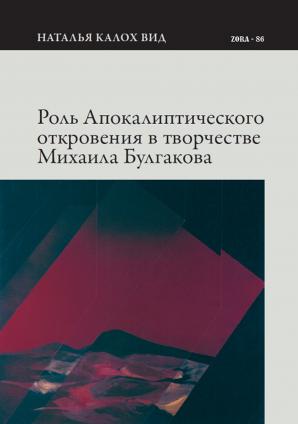Rolʹ apokaliptičeskogo otkrovenija v tvorčestve Mihaila Bulgakova
Synopsis
The Role of Apocalyptic Revelation in the Works of Mikhail Bulgakov. Natalie Kaloh Vid's semiotically designed book The Roll of Apocalyptic Revelation in the Works of Mikhail Bulgakov, interwoven with contemporary post-structuralist observations, opens to the reader a web of intertextual relations that characterize the poetics and aesthetics of one of the greatest writers of the 20th century, Michael Bulgak. The author's careful linguistic analysis reveals the motif-thematic, metaphorical, numerological and ideological standpoints that the Russian writer systemises in the construction of his own and (according to Kaloh Vidova) for the Russian culture, in general, a characteristic "single apocalyptic syezhe." In the author's perspective, this phrase draws attention to the multiplicity of intertextual connections that, in Bulgakov's optics, accumulate into an encyclopedically based reflection on human history and grow into an artistically imaginative dialogue with those texts of culture that seem to have a clear or covert connection with biblical Revelation. If Kaloh Vidova's monograph is characterized by a 'philological approach', which shows how linguistic analysis can show the creative thinking of an individual artist and reveal the specifics of artistic modeling of the world in contact with apocalyptic and eschatological texts, then her thinking becomes a cultural-historical analysis. the 'spirit of the times' in which the writer was creating. In this way, she succeeds in charting a path of thought that is supposed to answer the question of the messianic role of the 'Russian soul' in the preservation of humanistic values in an apocalyptic time ruled by the Antichrist. The engaged and scientifically committed mind of Kaloh Vidova reveals that the "apocalyptic role" plays a special role in the "silver age of Russian culture." This is not only a sign reminiscent of the artistic achievements of Russian symbolism, but also marks the time of the passage from the 19th to the 20th century, which was interpreted in the works of Russian philosophers and poets as the prediction of the doomsday: as "the death of the spirit of culture" (Berdjaev ), as "the kingdom of the Antichrist" (Trubecka), followed by the "self-destruction of man" by Merezhkovsky).
Downloads






